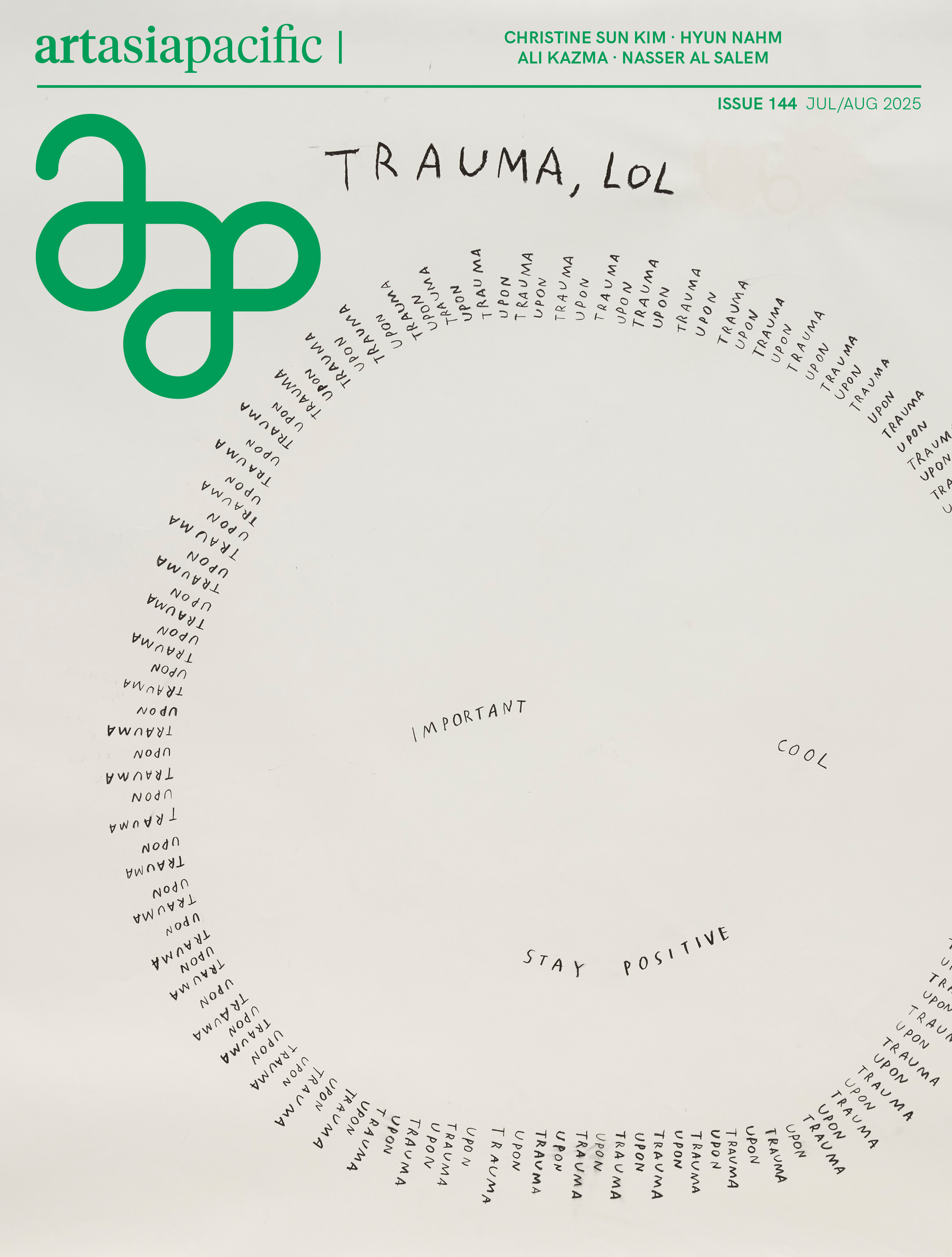Issue no. 60
September – October 2008
The Society of the Spectacle
All eyes were on China this August for the grandiose spectacle of the 2008 Beijing Olympics. Some four billion television viewers—more than half the people on the globe—were said to have tuned in. In early September, less than two weeks after the Olympics, a series of mega-exhibitions and art fairs will open, causing compass needles to spin wildly across the Asia-Pacific region. Beginning with Biennale of Sydney’s closing celebration and leaping to Gwangju, Busan, Guangzhou, Shanghai and Singapore on to Taipei and Yokohama, art audiences will be whisked about on a grand tour twice as long as Europe’s—comprised of the Venice Biennale, documenta and Skulptur Projekte Münster—in June 2007.
By the time the air miles are tallied and the carbon footprints are offset, worldwide attention will shift to the media-frenzy around the US presidential election in November. ArtAsiaPacific no. 60 keeps pace with both the self-seeking contemporary art world and the seismic, real-world affairs that impact it, examining how artists participate in and critique these cultural spectacles. AAP no. 60 previews the biennials proliferating in Asian cities eager to boost their cultural credentials and tourism, highlighting each event’s curatorial premise, artists to watch and curators behind the scenes.
As artists become crucial players in cultural initiatives around the globe, few embrace the contemporary spectacle as well as Anish Kapoor, whose impressive sculptural forms never cease to astonish. Sandhini Poddar, an assistant curator at the Guggenheim Museum, goes beneath the surface of Kapoor’s work, looking at his “proto-objects,” which Poddar explains, “come into being before language, before aesthetics, before thought, and before conditioning.”
Reminding us that many artists are deeply skeptical of the major changes taking place in the world, contributing editor Paul Laster examines the satirical work of Hong Kong-born, New York-based Kenneth Tin-Kin Hung, who creates ribald satires of American politics in his colorful collage-like sculptures and videos. In a more muted hue, AAP managing editor HG Masters looks at Vietnam-born An-My Lê, whose large-format photographs deconstruct the military’s self-mythologization. And Gertrude Contemporary Art Spaces’ director Alexie Glass and AAP Features editor Andrew Maerkle zero in on globe-trotting conceptualist Heman Chong and his experiments with images, objects and sci-fi literature as he attempts to create a new visual language.
Other artists showing this September in Asia are profiled, including Tokyo-based Shinji Ohmaki, tapped for the Yokohama Triennale, and Brooklyn’s Byron Kim, participating in the Gwangju Biennale, who is wonderfully captured in his studio by photographer Lois Conner for Where I Work. Meanwhile, Paris desk editor Deepak Ananth interviews NS Harsha, a favorite among biennial curators and the winner of the third Artes Mundi prize in April. For The Point, Michael Young considers the perils of self-censorship in response to the recent Bill Henson controversy in Australia.
And as the September season begins, so do the art fairs. Ian Driscoll meets ShContemporary’s director, Lorenzo Rudolf, previously in charge of Art Basel, to discuss the intricate process of mounting ambitious fairs. New Delhi desk editor Deeksha Nath writes on Sumedh Rajendran, debuting in ShContemporary’s “Best of Discovery” section. If you are in Shanghai, be sure to visit ArtAsiaPacific‘s lounge at ShContemporary to see Wim Delvoye’s latest controversial project TIM (2006- ), the subject of this issue’s State of the Art by Chin-Chin Yap, who considers “the pandora’s box of legal conundrums” surrounding this particular object of desire.
The season ahead will deliver a heavy dose of spectacles. But as Situationist International’s Guy Debord wrote in his 1967 book The Society of the Spectacle, “The spectacle is a concrete inversion of life, an autonomous movement of the nonliving.” Let’s hope that today’s spectacles will challenge our thoughts and perceptions of the world around us, and indeed cause us to move.










